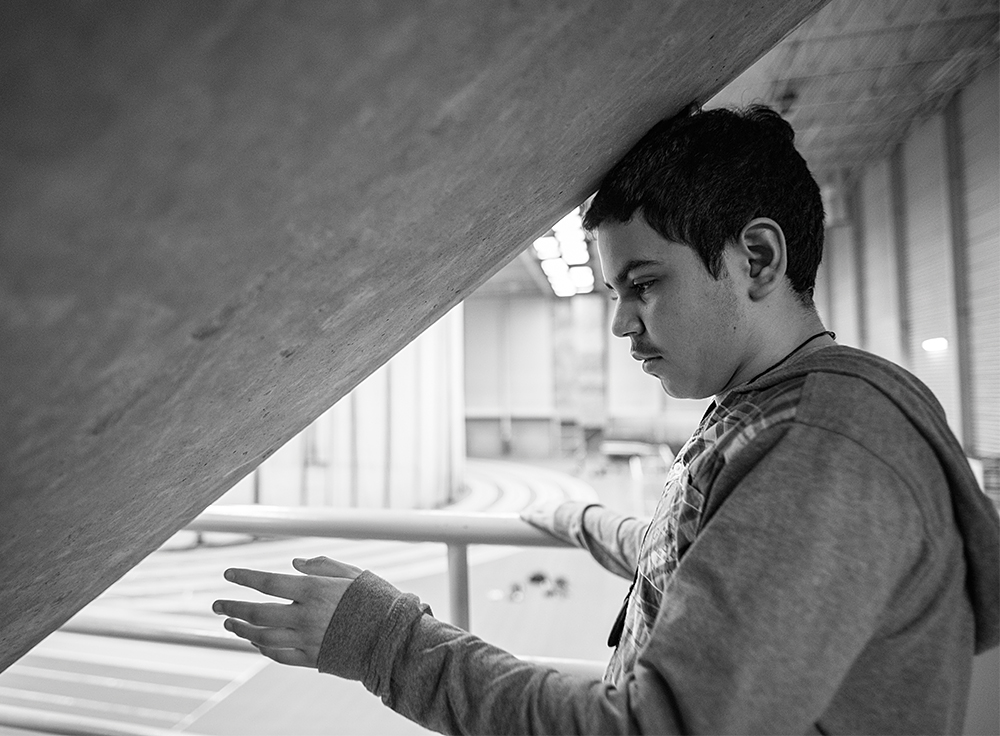
Photo by John Ulan
At first glance, Miguel Rodriguez looks like any other uninterested teenager. He is 13 years old with a shadow of a moustache and the careless gait often associated with youth. As I approach to say hello, he gazes off into the distance. His lack of eye contact reminds me to go slow. From conversations with his mother, Perla, I know that Miguel's autism means he doesn't speak and avoids touch with people he doesn't know, so I just smile and keep a respectful distance.
It's 3:30 on a sunny Friday afternoon, and Perla is gently guiding Miguel across the parking lot of the University of Alberta's Van Vliet Complex and into the Steadward Centre for Personal & Physical Achievement for his weekly session at Free2BMe. The program is offered to children and youth who live with all manner of physical, sensory or developmental impairments.
After they leave, Perla sits down with a sigh. She is a nurturing, protective mother but her fatigue shows through her warm smile. "This hour is my only respite," she says. She rests her cheek on her hand and recounts all the time her son has spent in hospital since he was born.
"I didn't even know how to teach him things like sports," says Perla.
She searched for a program to help Miguel be active and socialize but couldn't find one that fit his complex needs. She desperately wanted - needed - someone to believe in him. After years of dead ends, someone recommended Free2BMe. Perla decided to give it a try but had little hope that the program would be any different.
The centre welcomed six-year-old Miguel without hesitation.
He was starting at the beginning, says Perla. When a coach gave Miguel a ball, the boy would cry with frustration. He didn't know what to do with it.
Today, Miguel knows exactly what to do when he comes to the centre. He runs on the treadmill. He trains with weights. His favourite activity is Rollerblading - something that terrified Perla at first. She covers her eyes at the memory. Most importantly, Miguel also interacts with his coaches - a critical step forward.
"The people here don't see the disability with Miguel," says Perla as we watch him on his Rollerblades. "He changes when he walks through the door. He is trusting, he feels safe and OK to be in contact with someone and express his feelings." Miguel coasts by, a proud expression on his face, as Schaefer runs to keep up.
"Nobody believed in his potential, but these guys do - sometimes even more than I do, it seems," Perla says.
In 2015, Free2BMe helped more than 600 children and youth in individual and group training programs. Perla wishes Miguel could train more often but with only three full-time and two part-time employees, the non-profit program doesn't have enough staff. They certainly have enough clients and university student volunteers - there's a wait-list for both - but it's essential that the centre also has qualified coaches to work with the kids.
All too soon the hour is up and Miguel is ready to go home. As we make our way toward the parking lot, he wraps an arm around me while looking in the other direction. I'm surprised by this unexpected hug - and honoured. Miguel has come so far. But then again, so has Perla. They're on this journey together, facing challenges and relying on the compassion and expertise offered by Free2BMe. When Miguel pushes off on his Rollerblades with a smooth path ahead of him and smiling caregivers behind him, he is truly free to be himself.
For more than 10 years, Free2BMe, through the Faculty of Physical Education and Recreation, has empowered children and teens who experience disability to become physically fit, healthy and strong, and to feel good about themselves.